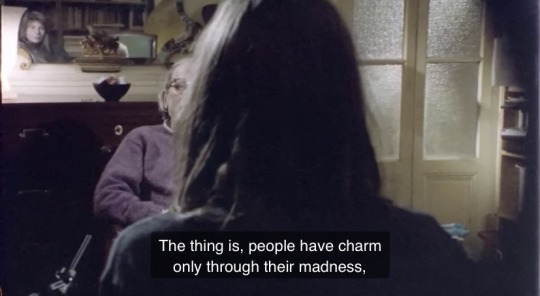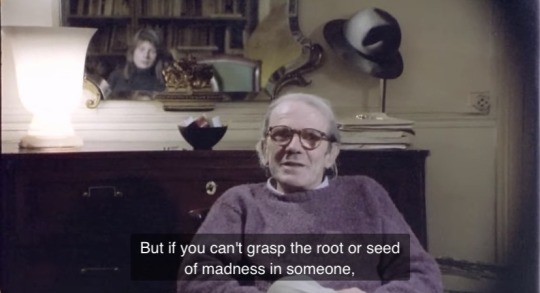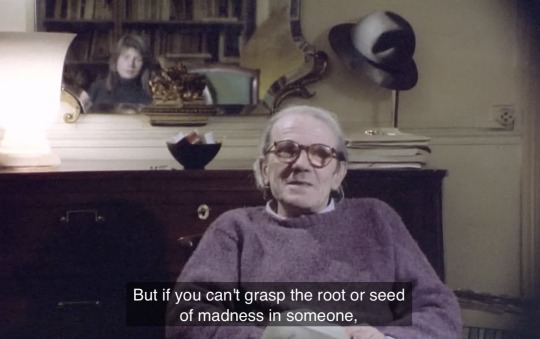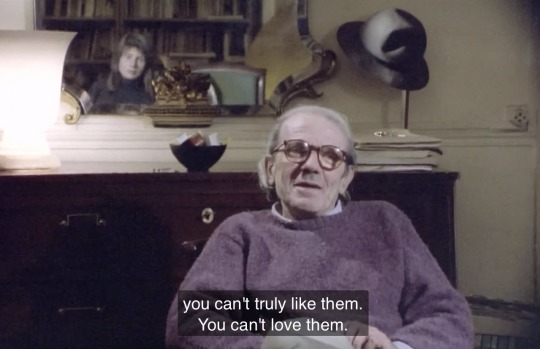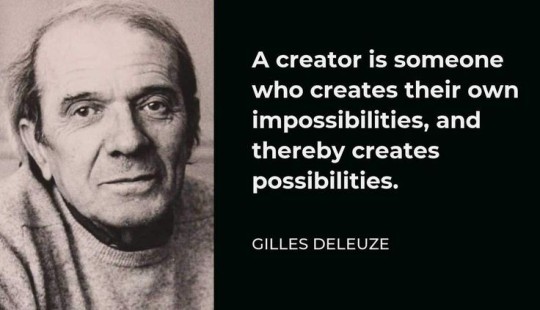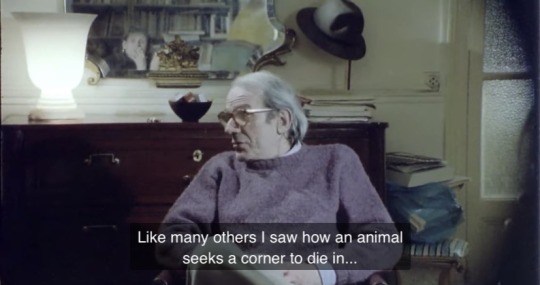#gilles deleuze
Text
We’re riddled with pointless talk, insane quantities of words and images. Stupidity’s never blind or mute. So it’s not a problem of getting people to express themselves but of providing little gaps of solitude and silence in which they might eventually find something to say. Repressive forces don’t stop people expressing themselves but rather force them to express themselves; what a relief to have nothing to say, the right to say nothing, because only then is there a chance of framing the rare, and ever rarer, thing that might be worth saying.
Gilles Deleuze, Negotiations, 1972-1990
1K notes
·
View notes
Text
Smoking that shit that made Gilles Deleuze it
205 notes
·
View notes
Text
A true politics of psychiatry, or anti-psychiatry, would consist therefore in the following praxis: (1) undoing all the reterritorializations that transform madness into mental illness; (2) liberating the schizoid movement of deterritorialization in all the flows, in such a way that this characteristic can no longer qualify a particular residue as a flow of madness, but affects just as well the flows of labor and desire, of production, knowledge, and creation in their most profound tendency. Here, madness would no longer exist as madness, not because it would have been transformed into "mental illness," but on the contrary because it would receive the support of all the other flows, including science and art—once it is said that madness is called madness and appears as such only because it is deprived of this support, and finds itself reduced to testifying all alone for deterritorialization as a universal process. It is merely its unwarranted privilege, a privilege beyond its capacities, that renders it mad. In this perspective Foucault announced an age when madness would disappear, not because it would be lodged within the controlled space of mental illness ("great tepid aquariums"), but on the contrary because the exterior limit designated by madness would be overcome by means of other flows escaping control on all sides, and carrying us along.
– Gilles Deleuze and Félix Guattari, Anti-Oedipus: Capitalism and Schizophrenia
Perhaps one day one will no longer know clearly what madness really was...Artaud will belong to the ground of our language, and not to its rupture...Everything that we experience today in the mode of the limit, or of strangeness, or of the unbearable, will have joined again with the serenity of the positive. And what for us currently designates this Exterior stands a chance, one day, of designating us.
– Michel Foucault, History of Madness
#a world created in the process of its tendency#je est un autre#gilles deleuze#félix guattari#michel foucault#anti-oedipus
148 notes
·
View notes
Text



"J comme Joie", L'Abécédaire de Gilles Deleuze
139 notes
·
View notes
Quote
Control is not discipline. You do not confine people with a highway. But by making highways, you multiply the means of control. I am not saying this is the only aim of highways, but people can travel infinitely and "freely" without being confined while being perfectly controlled. That is our future.
gilles deleuze, “what is the creative act?”
515 notes
·
View notes
Text
Siamo pervasi di parole inutili, di una quantità folle di parole e di immagini. La stupidità non è mai muta né cieca. Il problema non è più quello di fare in modo che la gente si esprima, ma di procurare loro degli interstizi di solitudine e di silenzio a partire dai quali avranno finalmente qualcosa da dire. Le forze della repressione non impediscono alla gente di esprimersi, al contrario la costringono ad esprimersi. Dolcezza di non aver nulla da dire, diritto di non aver nulla da dire: è questa la condizione perché si formi qualcosa di raro o di rarefatto che meriti, per poco che sia, d’esser detto.
G. Deleuze
43 notes
·
View notes
Text
Debt towards the divinity is always a kind of debt that one can never escape from, and this means one must constantly experience the feeling of guilt. As the priest continues to direct these reactive forces, the crowning achievement of the bad conscience is when we come to the valuation that the guiltier one feels, the better person he is.
Gilles Deleuze
49 notes
·
View notes
Text
With Nietzsche, everything is mask. [...] Nietzsche didn't believe in the unity of a self and didn't experience it. Subtle relations of power and of evaluation between different "selves" that conceal but also express other kinds of forces—forces of life, forces of thought—such is Nietzsche's conception, his way of living. ...His madness was his final mask. He had written: "And sometimes madness itself is the mask that hides a knowledge that is fatal and too sure." In fact, it is not. Rather, it makes the moment when the masks, no longer shifting and communicating, merge into a death-like rigidity. Among the strongest moments of Nietzsche's philosophy are the pages where he speaks of the need to be masked, of the virtue and the positivity of masks, of their ultimate importance.
Gilles Deleuze, Pure Immanence: Essays on a Life
358 notes
·
View notes
Text
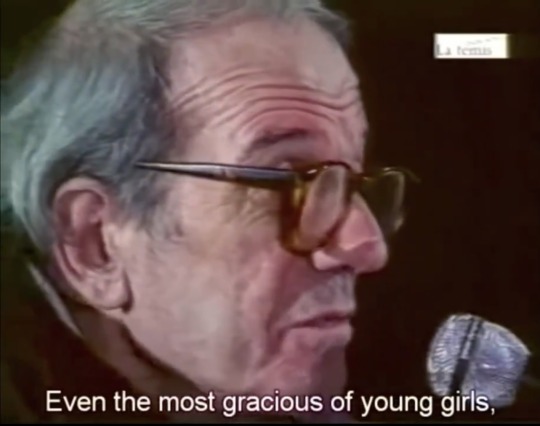

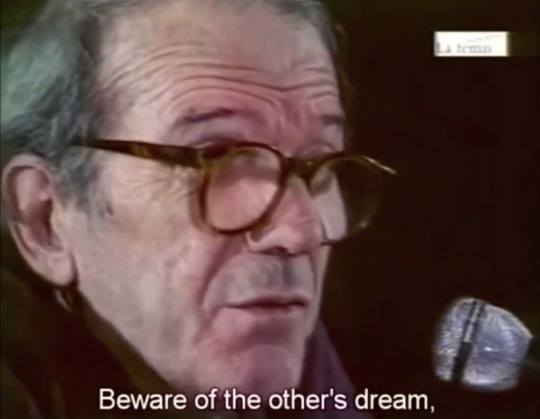
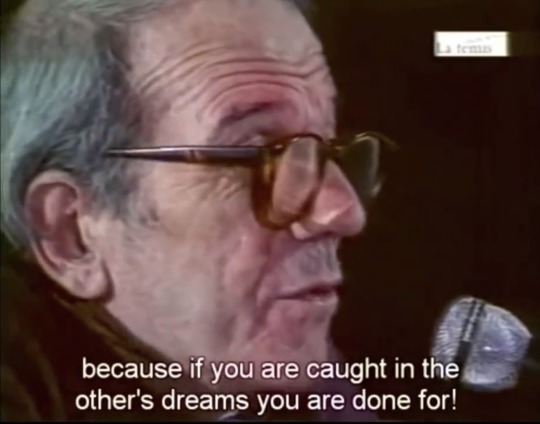
Deleuze on dreams.
76 notes
·
View notes
